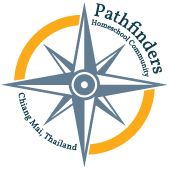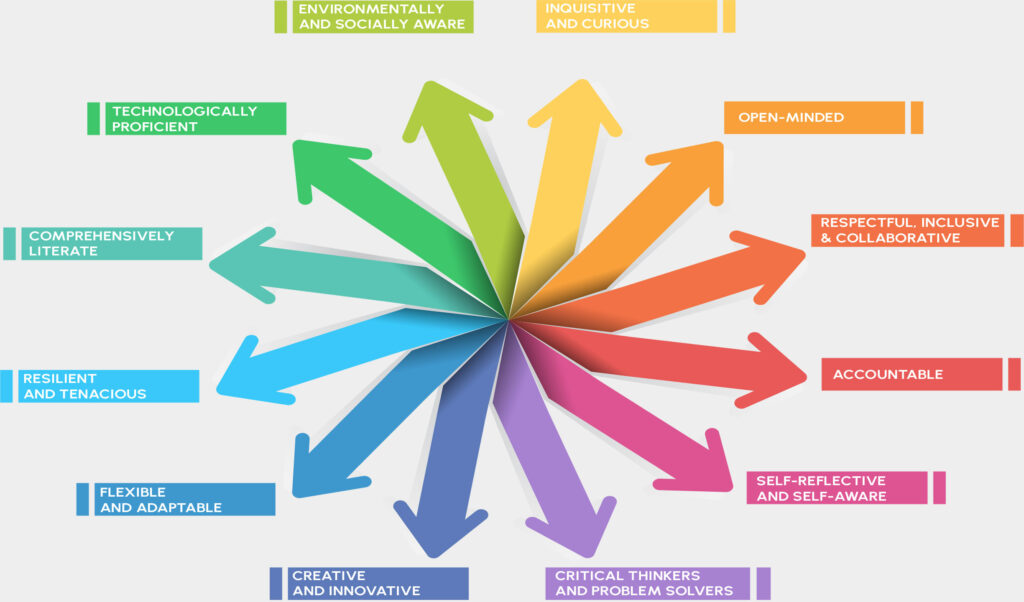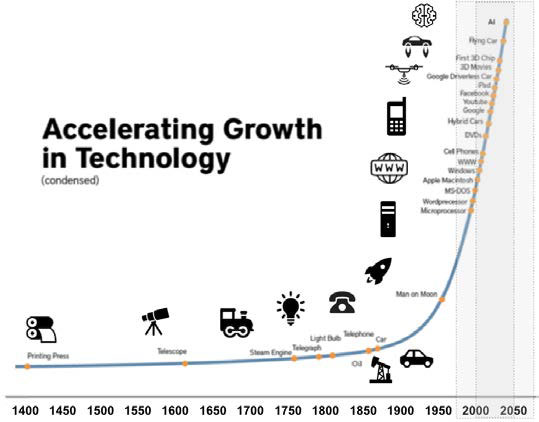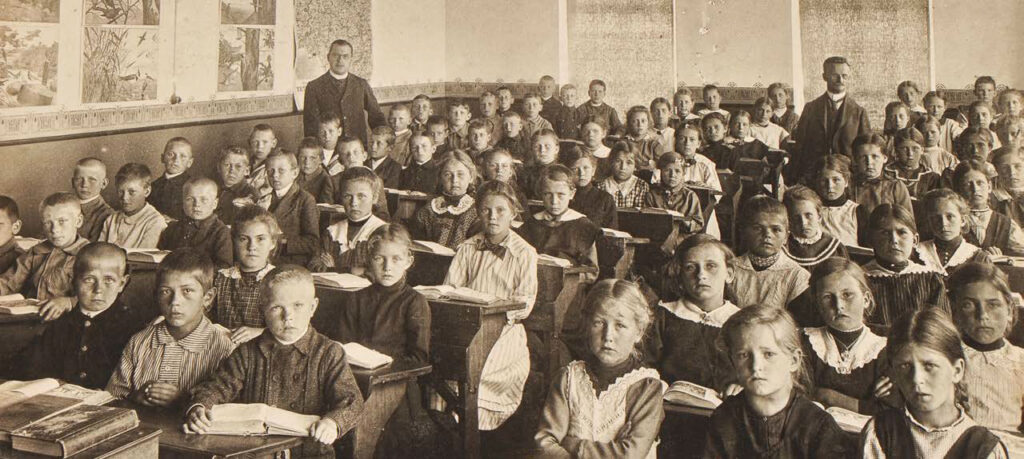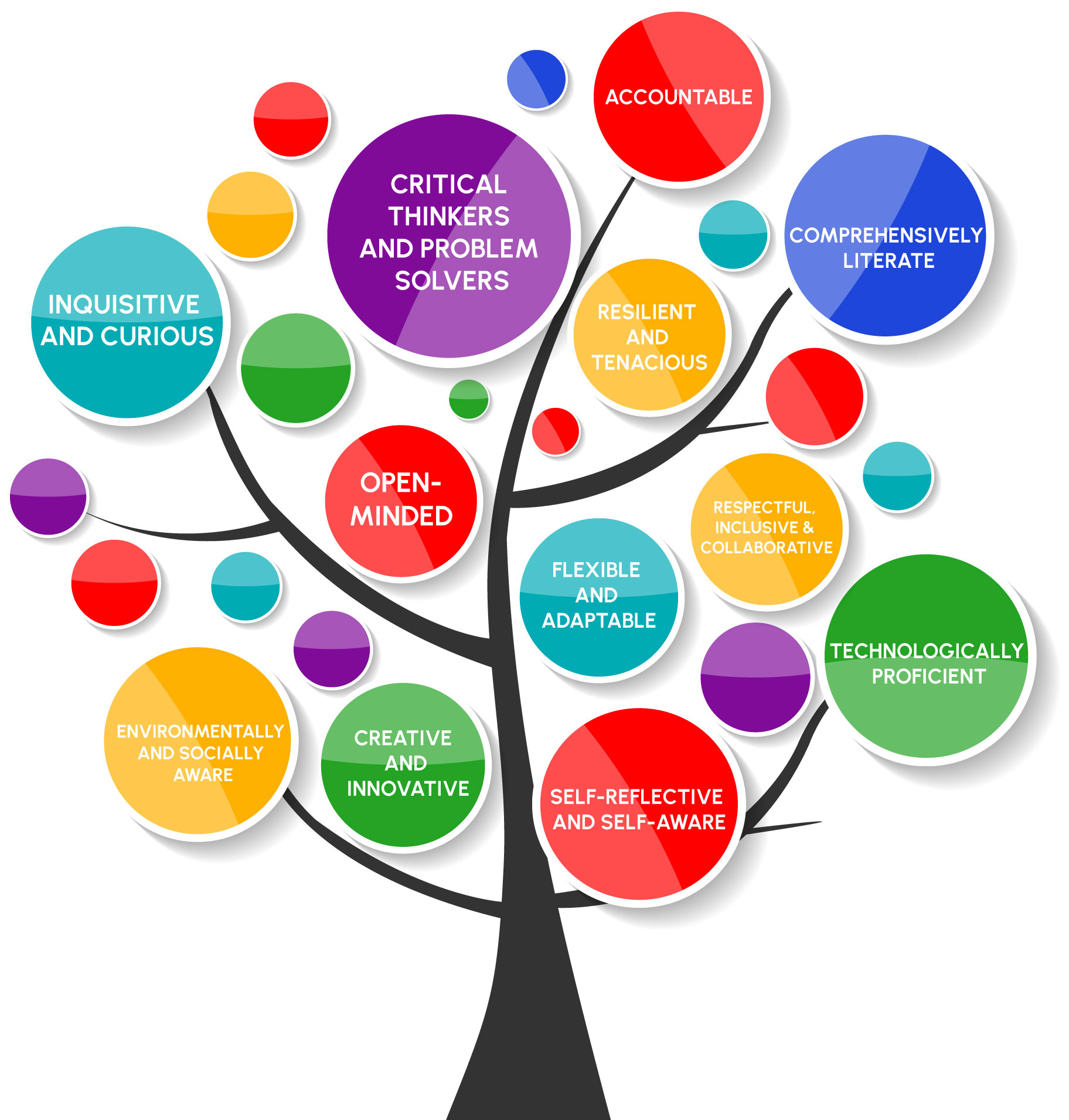What is the future?
No one knows.
Global computing power has been doubling every two years for decades. Self-driving cars, personal robots, and artificial intelligence are now a part of our daily lives. Can you imagine what the world will look like in five years, let alone when today’s kindergarteners leave school? How can we prepare our children for such an unpredictable future?
Such dramatic technological change impacts every part of our lives, from how we work to how we communicate and learn. Looking ahead, it’s clear that the jobs and skills needed will change in ways we can’t even imagine. This uncertainty calls for a different approach to education—one that helps our children learn constantly and adapt as they grow. Because children are our love and our future, we must prepare them to thrive no matter what the future holds.
‘The illiterate of the 21st century will not be those who cannot read and write but those who cannot learn, unlearn, and relearn.’
Alvin Toffler, Writer and Futurist
The Unpredictable Future
Dramatic Technological Change
The pace of technological change is staggering. The number of transistors on a microchip doubles every two years, leading to huge increases in computing power. This phenomenon, known as Moore’s Law, means that today’s technology quickly evolves with new advancements. Just a few years ago, who would have imagined machines diagnosing diseases faster and more accurately than doctors? Now, we carry supercomputers in our pockets—20 years ago, their capabilities would have seemed magical, but today they’re birthday presents for older children.
‘We are currently
preparing students for jobs that don’t yet exist… using technologies that haven’t been invented… in order to solve problems we don’t even know are problems yet.’
Richard Riley, former U.S.
Secretary of Education
Uncertainty of Future Careers
With such rapid technological advancements, predicting the future job market is nearly impossible. The World Economic Forum predicts that by 2025, 65% of children entering primary school today will work in jobs that do not yet exist. Think about it—roles like data scientist and social media manager were unheard of a decade ago. Looking ahead, we might see new professions, such as AI ethicists or quantum network engineers, roles that are just beginning to take shape. How do we prepare our children for careers that don’t exist yet?
Lessons from History
The technological revolution we are experiencing today rivals the societal impact of the Industrial Revolution. Industrialisation created new jobs, and the resulting urbanisation revolutionised societies. These changes necessitated the development of mass education and the current school system. However, after serving the needs of economies and cultures for the last 250 years, it is a system buckling under the breakneck pace of technological advances.
Literacy rates increased significantly during the Industrial Revolution. In England, for example, they rose from around 53% in 1800 to 76% in 1870, largely due to the expansion of public education.
The Erosion of Traditional
Education Systems
Challenges of a Rapidly Changing World
Our current education system was designed for the industrial age, focusing on uniformity and preparing students for predictable careers in stable industries. This model worked well when societal and technological changes were gradual and predictable.
However, in today’s world, this traditional model struggles to keep up. According to a report by the World Economic Forum, 65% of children entering primary school today will end up working in jobs that do not yet exist. The current curriculum often fails to equip students with the skills needed for these emerging roles. For instance, traditional education emphasises rote learning and memorisation over critical thinking and problem-solving, which are crucial in today’s fast-paced, technology driven world.
‘Today’s schools are like yesterday’s factories, preparing students for an outdated industrial world.‘
Andreas Schleicher, Director for Education and Skills
at the Organisation for Economic Co-operation and Development (OECD)
Resistance to Change
Despite these challenges, significant resistance to radical change exists within educational institutions. This resistance often stems from deeply entrenched practices and the logistical difficulties of overhauling entire educational systems
Emerging Educational Needs
Research has shown that personalised education can significantly improve student outcomes. A study by the Bill & Melinda Gates Foundation demonstrates that personalised learning approaches can lead to better academic performance and greater student engagement. Many of the world’s best schools are successfully implementing personalised learning models, allowing students to progress at their own pace and focus on areas where they need the most support.
The Need for A New
Educational Paradigm
Embracing the Digital Age
Education must integrate digital literacy into curricula to keep pace with rapid technological advancements. LEAP Innovations, for example, partners with schools to implement personalised learning models that harness the power of technology. Digital tools and resources open up a world of learning for students of unlimited variety and opportunity. Embracing technological change opens pathways for every student to thrive.
‘The world needs a new curriculum, one that will prepare students for the challenges and opportunities of the 21st century.‘
Ken Robinson, Education Reform Advocate
‘Education is not the learning of facts, but the training of the mind to think.‘
Albert Einstein, Theoretical Physicist
Cultivating Lifelong Learners
In an ever-changing economy, the ability to learn continuously is crucial. A study by the Pew Research Center found that 87% of workers believe ongoing training and skill development are essential throughout their careers. To truly prepare students for lifelong learning, we must teach them how to learn by fostering a habit of curiosity and personal development.
Creating Personalised Learning Paths
Research shows that personalised education significantly improves student outcomes. In personalised learning environments, students can move at their own speed and get help where they need it most. This engages students and motivates them to take responsibility for designing their own learning pathways. This process builds critical thinking, decision-making, and problem-solving skills, turning them into proactive, lifelong learners ready to handle future challenges
‘Personalised learning environments that foster a growth mindset can significantly enhance students’ motivation and achievement.‘
Carol Dweck, Motivational Psychologist
Holistic Education for the Whole Child
Education today must address more than just academic knowledge; it must also nurture students’ emotional and social well-being. According to the World Health Organisation, one in four children and adolescents experience mental health issues. Integrating social-emotional learning into the curriculum teaches students mindfulness, empathy, and emotional regulation. These skills are vital for personal development and help students navigate the complexities of modern life.
The Crucial Role of Teachers
Adapting to New Educational Paradigms
Teachers are no longer just providers of knowledge; they are now facilitators and guides, helping students navigate their personalised learning journeys. This shift requires teachers to adopt new methods and embrace technology to support individualised learning experiences. Freed from the chains of traditional curriculum, teachers can tailor their teaching to meet each student’s unique needs and interests.
‘Technology will never replace great teachers, but technology in the hands of great teachers is transformational.‘
George Couros, Educator
‘It is the supreme art of the teacher to awaken joy in creative expression and knowledge.‘
Albert Einstein, Theoretical Physicist
Cultivating Lifelong Learners
In an ever-changing economy, the ability to learn continuously is crucial. A study by the Pew Research Center found that 87% of workers believe ongoing training and skill development are essential throughout their careers. To truly prepare students for lifelong learning, we must teach them how to learn by fostering a habit of curiosity and personal development.
Commitment to Professional Growth
Teaching under this new paradigm puts teachers at the cutting edge of learning and professional development. Continuous professional development is crucial for teachers to stay updated with the latest educational technologies and methodologies. By engaging in ongoing learning, teachers enhance their skills and introduce fresh, innovative approaches to their classrooms, significantly enriching their students’ educational experience.
‘Teachers must be lifelong learners if
they are to teach the skills required
for the 21st century.‘
Andy Hargreaves, Professor and Education
Reformer
‘A teacher affects eternity; they can never tell where their influence stops’
Henry Adams, Author and Educator
Building Strong Relationships
Strong teacher-student relationships are vital for effective learning. Mentorship programmes, where teachers act as mentors rather than traditional instructors, can significantly enhance student engagement and motivation. These relationships help create a supportive learning environment where students feel valued and understood, fostering a deeper connection to their education and encouraging a lifelong love of learning.
Embracing The Future
The Case for Educational Change
The rapid pace of technological change and the unpredictability of future careers demand a new approach to education. Traditional systems designed for the industrial age are no longer adequate to prepare students for the challenges and opportunities of the future. By embracing personalised education and fostering continuous learning and adaptability, we can equip our children with the skills they need to thrive in an ever-changing world.
‘The fact is that given the challenges we face; education doesn’t need to be reformed — it needs to be transformed.‘
Ken Robinson, Education Reformer
‘Children must be taught how to think, not what to think.‘
Margaret Mead, Cultural Anthropologist
Pathfinders: Exploring New Educational Frontiers
At Pathfinders, we are implementing the ideas set out in this article. We believe in developing and implementing these concepts, creating an education system that prepares students for the future. We don’t have all the answers, but we are committed to being open, transparent, and willing to collaborate. Our goal is to continually improve and adapt our approach to meet the needs of our students.
Pathfinders’ Growth and Impact
In just two years, Pathfinders has grown from 14 to 45 students. This growth reflects parents’ deep desire for a more relevant and meaningful education for their children. Our families clearly see the limitations of traditional education and recognise that by the time mainstream education catches up, their children will have finished school. They understand the urgent need for a system that embraces personalised learning now. Our commitment to this vision and steady growth show that parents and students seek something different and better. We are proud to lead this educational revolution, dedicated to nurturing each student’s unique potential and preparing them for a brighter future.
‘Education is our passport to the future, for tomorrow belongs to the people who prepare for it today.‘
Malcolm X, Civil Rights Advocate
Join Us in Shaping the Future
If you’re a parent unhappy with the traditional education system and want something different for your child, come and visit Pathfinders. See for yourself how our personalised learning environment nurtures each child’s unique potential. Why settle for an outdated system when you can give your child an education that prepares them for the future?
Teachers looking to be freed from the confinement of traditional education and who want to explore a more holistic approach are encouraged to get in touch. Are you ready to join a community of educators passionate about cutting-edge ideas and innovative teaching methods? We are open to new ideas and eager to develop collaborations with education pioneers worldwide.
A Vision for Tomorrow
Let us commit to a future where education is not just about imparting knowledge but about nurturing curiosity, fostering resilience, and empowering the next generation to shape their own destinies. In a world where the future is uncertain and technology is rapidly changing, our children need more than traditional education can offer. They need the skills to learn, adapt, and thrive in an ever-evolving landscape. By working together, we can create an education system that prepares our children for whatever the future holds, ensuring they are ready to face the unknown with confidence and enthusiasm. Let’s embrace this challenge and build a brighter, more adaptable future for our children.
